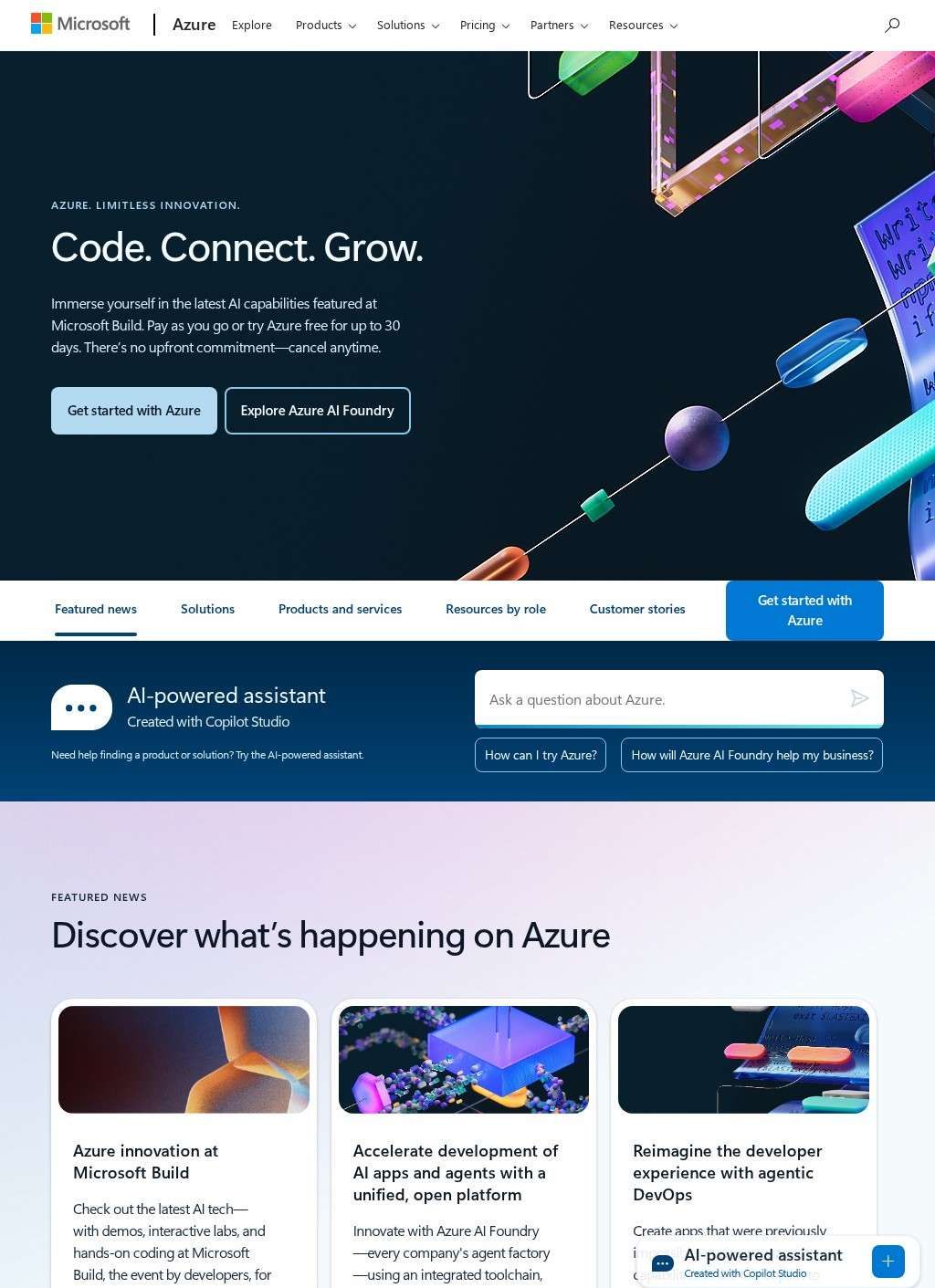Microsoft Azure has emerged as a leading cloud computing platform for web development, offering a comprehensive suite of services that enable developers to build, deploy, and manage web applications at scale. As the second-largest cloud provider with approximately 24% market share, Azure provides an integrated ecosystem of development tools, infrastructure services, and platform capabilities specifically designed to support modern web development practices. The platform's strength lies in its seamless integration with Microsoft's broader technology ecosystem while supporting open-source technologies and cross-platform development approaches.
Azure's web development services center around Azure App Service, a fully managed platform-as-a-service offering that supports web applications, REST APIs, and mobile backends. App Service provides built-in scaling, load balancing, and security features while supporting multiple programming languages including .NET, Java, Node.js, Python, and PHP. The service automatically handles infrastructure management, allowing developers to focus on application logic rather than server configuration and maintenance. Auto-scaling capabilities adjust resources based on demand, ensuring optimal performance during traffic spikes while controlling costs during periods of lower usage.
Container support through Azure Container Instances and Azure Kubernetes Service enables modern web development practices using microservices architectures. AKS provides managed Kubernetes orchestration for containerized applications, handling cluster management, security patching, and scaling operations. This approach supports complex web applications that benefit from independent deployment and scaling of individual services. Azure Container Registry provides secure storage for container images, while integration with Azure DevOps enables continuous integration and deployment pipelines for containerized web applications.
Database services on Azure accommodate diverse web development requirements through Azure SQL Database, Azure Database for MySQL, PostgreSQL, and Cosmos DB. Azure SQL Database provides a fully managed relational database with automatic scaling, backup, and security features optimized for web applications. Cosmos DB offers globally distributed NoSQL capabilities with guaranteed low latency and automatic scaling for web applications requiring high performance and global reach. These managed database services eliminate database administration overhead while providing enterprise-grade security, compliance, and disaster recovery capabilities.
Azure's serverless computing capabilities through Azure Functions enable event-driven web development patterns that scale automatically based on demand. Functions can handle HTTP requests, process form submissions, integrate with databases, and perform background processing tasks without requiring server management. Integration with Azure Logic Apps provides workflow automation capabilities that can respond to web application events and integrate with hundreds of external services. This serverless approach reduces operational complexity while providing cost-effective execution models for web applications with variable workloads.
Developer productivity tools and services within Azure enhance the web development experience through integrated development environments, source control, and deployment automation. Azure DevOps provides comprehensive development lifecycle management including Git repositories, build pipelines, release management, and project tracking. Visual Studio integration enables seamless development and deployment experiences for .NET applications, while support for open-source tools ensures compatibility with diverse development preferences. Azure Resource Manager templates enable infrastructure-as-code practices that ensure consistent, repeatable deployments across development, staging, and production environments.
Content delivery and global performance optimization through Azure CDN provide worldwide reach for web applications with reduced latency and improved user experiences. Azure CDN integrates seamlessly with other Azure services including Storage Accounts and App Service, automatically caching static content and optimizing delivery paths. Azure Front Door provides global load balancing and application acceleration services that route users to the nearest available endpoint while providing protection against distributed denial-of-service attacks. These services enable web applications to deliver consistent performance regardless of user location.
Security and identity management capabilities throughout Azure services provide comprehensive protection for web applications and user data. Azure Active Directory offers enterprise-grade identity and access management with support for single sign-on, multi-factor authentication, and integration with on-premises Active Directory systems. Azure Security Center provides unified security management and threat protection across Azure resources, while Azure Key Vault securely stores and manages application secrets, certificates, and encryption keys. These integrated security services enable developers to implement robust security controls without building complex security infrastructure.
Hybrid cloud capabilities distinguish Azure from purely cloud-native platforms by enabling seamless integration between on-premises infrastructure and cloud services. Azure Stack portfolio brings Azure services to on-premises data centers and edge locations, enabling consistent development and deployment experiences across hybrid environments. Azure Arc extends Azure management and services to any infrastructure, enabling organizations to manage servers, Kubernetes clusters, and databases consistently regardless of their location. This hybrid approach particularly benefits enterprises with existing Microsoft infrastructure investments.
Monitoring, analytics, and artificial intelligence services provide advanced capabilities for web application optimization and user experience enhancement. Azure Monitor provides comprehensive observability across applications and infrastructure, while Application Insights offers detailed application performance monitoring and user behavior analytics. Azure Cognitive Services enable web applications to incorporate artificial intelligence capabilities including speech recognition, image analysis, and natural language processing without requiring specialized AI expertise. These services help developers create intelligent web applications that can adapt to user needs and provide personalized experiences.
Enterprise integration and compliance capabilities make Azure particularly attractive for organizations with complex regulatory requirements and existing Microsoft technology investments. Azure's compliance certifications span global, government, and industry-specific standards including GDPR, HIPAA, FedRAMP, and SOC. Integration with Microsoft 365, Dynamics 365, and Power Platform creates comprehensive business application ecosystems that extend web applications into broader organizational workflows. This enterprise-grade foundation enables web applications to serve as integral components of larger digital transformation initiatives while maintaining security, compliance, and governance requirements.
